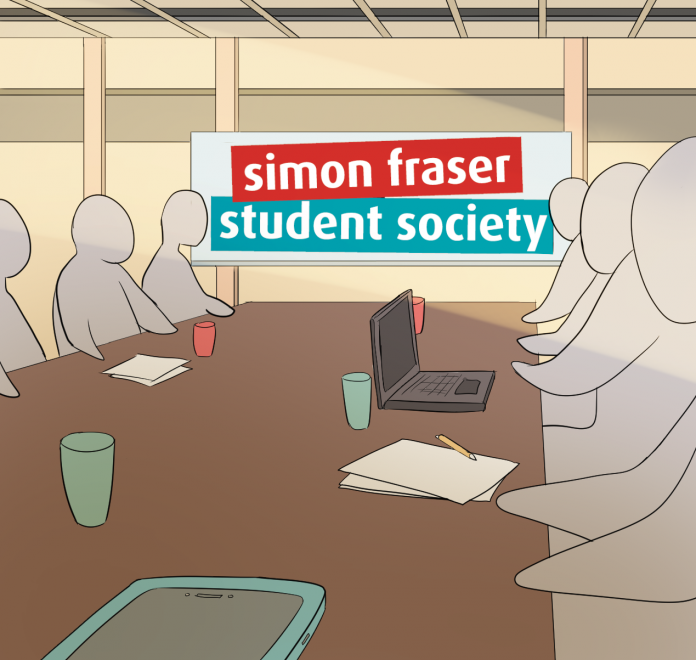Written by Amneet Mann, News Editor
Board changes signatory for banking resolutions
In light of the impeachment of the former Simon Fraser Student Society (SFSS) president Jas Randhawa, the board appointed vice-president student services Samer Rihani as one of the signatories on behalf of the student society in banking matters.
The other signatory is SFSS CEO Martin Wyant and, in the absence of Wyant, Build SFU general manager Marc Fontaine.
Financing regarding SUB provided
Vice-president Matthew Chow elaborated on the long-term and short-term loans the society has taken out to finance the Student Union Building (SUB).
He noted that the society is currently using three different types of loans for the project. For the duration of the construction, the society is engaged in a short-term construction loan, which they use to pay off the invoices they receive from the university every few months.
Once construction is completed, the society will switch over to a long-term loan on August 1 which will last for 25 years. The long-term loan will be used to pay off the short-term loan, which will also provide an interest rate swap for the society in the interest of saving the society money.
According to Chow, the long-term loan “helps our interest rate and it prevents us from paying too much [. . .] you don’t want to pay three years worth of loans in that period of time, you want to spread it out over 25 years.”
Chow noted that the society has currently borrowed $17 million to finance the SUB project, and project to borrow approximately $38 million it total by the end of the project. The SFSS has originally projected to borrow $43.3 million but due to the construction delay, they have received “a bit more leeway in terms of levy collection for the project itself.”
Publicization of board meeting times, agenda, and open-session items discussed
The Peak’s news editor, Amneet Mann, brought forward concerns regarding how board meeting times, agendas, and open-session attachments were not posted online or made available to the SFSS membership prior to the meetings themselves.
“[It] make[s] it a little bit difficult for the membership to come and engage when they don’t know that these meetings are happening or when they’re happening,” she said. Mann noted that, while SFSS by-laws 9(2) and 10(3) mandated that faculty student unions and department student unions hold “general meetings that are open to all of its members and gives it members notice of those meetings,” there was no analogous by-law for the SFSS board of directors meetings.
Vice-president university relations Jackson Freedman noted that a policy change at the level of a standard operating procedure would be possible to communicate board meeting times and agenda more broadly and with a more advanced notice.
He mentioned that the board was looking into the possibility of a recording feature for board meetings such as a live stream for students to watch.
Wyant noted that previous boards had set a regular biweekly time for meetings to take place, which was a possibility that this board could consider.
Structure of advocacy committee discussed
Vice-president external relations Jasdeep Gill raised concerns regarding the current function of student representatives on the SFSS advocacy committee.
She noted that the research done by student representatives often did not meet the standards of the province or other student unions and that so far, the board had been relying on staff members to do reputable research for the society. “We’ve been a lot more successful in getting research that’s actually reputable,” she said.
With the research roles being transferred to staff, Gill identified that student representatives did not have a significant role on the committee anymore, and suggested that the Advocacy Committee be put on hold on the fall term while the board discussed potential new roles for student representatives to have on that committee.
Board discusses bringing back Committee of Continuity
Applied sciences representative Kia Mirsalehi noted that this committee has been created the previous year by himself, Chow, and Randhawa. The purpose of the committee was to establish ongoing contact between current and previous board members to achieve continuity in terms of board initiatives and processes.
Chow noted that this committee had the potential to become a new advisory board for the SFSS. “We as board members are just students, we don’t have any formal training [ . . . ] and we all know our documentation is not the best so [it would help] if we could have a little bit of contextual understanding,” said Chow.




